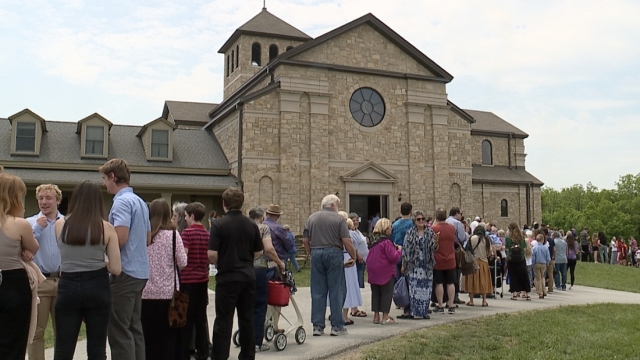For one reason or another, hundreds of people are making the pilgrimage to Gower, Missouri, to witness what many are calling a miracle.
In the basement of a Benedictine Monastery lies Sister Wilhelmina Lancaster, the foundress of The Benedictines of Mary, Queen of Apostles.
"People still have such a desire and a yearning to touch and be around God in any way possible," visitor Kimberly Alshahri said. "God does give us these precious gifts, and so many of us sometimes just sit on the sidelines and just wait and hope something else will happen, but when there's one here, you gotta come."
Lancaster's remains were exhumed last week, completely intact after being buried for four years.
Her condition was discovered while the abbess and sisters were moving her body to its final resting place inside their monastery chapel, a long-standing custom for founders and foundresses.
"Her habit is still completely intact, which she fought very hard for. Not a thread out of place, and this was the very same habit she was buried in," said Beth Vogel, who has been coming to the abbey for mass these last three years. "I just thought God is so good, he is giving the sisters hope."
Vogel says in general, there are less than 20 visitors on a daily basis.
Since the news of Lancaster was made public, there have been an average of more than 100 visitors a day.
SEE MORE: French priests must carry QR code as church battles sex abuse scandal
"We're here to see the miracle. It's a once in the lifetime for some of us, and [we've] never been this close to a possible saint who's laying uncorrupted," Michael Holmes said. "It proves to me as a Catholic that scripture is real, the gospel is real, God is real, God cares about us."
According to Catholic News Agency, the Catholic Church has a long-standing tradition of more than a 100 "incorruptible saints."
This means years after their death, their bodies have stayed immune to the natural decaying process.
For Catholics, these miracles signify holiness and give witness to the truth of Christ's resurrection.
"It means she had the grace of God pouring through her to the point that her body is incorruptible, and showing that there is an afterlife," Deborah Heffley said. "There are so many coincidences that I don't think are coincidences."
From the rosaries to handwritten prayers, visitors from all over the country poured out the deepest desires of their hearts.
Though many stood in silence, there was a sense of shared humanity. Visitors say the cultural and spiritual significance transcends religion.
"God doesn't send a miracle just for Catholics, it's for everybody," Alshahri said.
This story was originally published by JuYeon Kim at Scripps News Kansas City.
SEE MORE: Annual list of worst nations for religious freedom released
Trending stories at Scrippsnews.com



